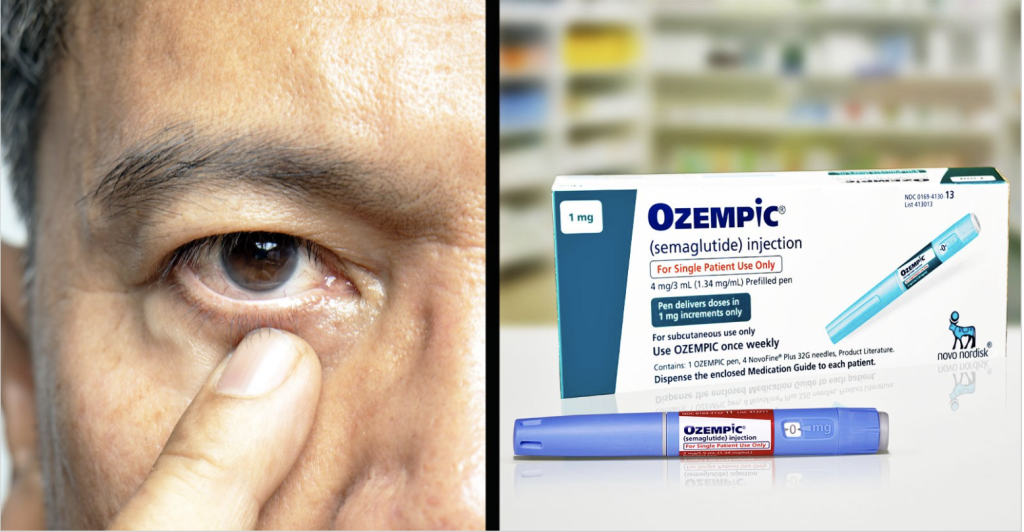
Please Follow us on Gab, Minds, Telegram, Rumble, Gettr, Truth Social, Twitter
Diabetes patients who took Ozempic were more than twice as likely to develop an eye condition that causes vision loss than patients using a different diabetes drug, according to a new study.
The study linked semaglutide, the active ingredient in Ozempic and Wegovy — which in addition to treating diabetes are widely used to lose weight — to non-arteritic anterior ischemic optic neuropathy (NAION).
The study, published last week on a preprint server, is undergoing peer review.
NAION can result in sudden vision loss due to loss of blood flow to the optic nerve. It is a major cause of severe vision loss and blindness in adults and the second-most common form of optic nerve damage after glaucoma. There is no effective treatment for the condition.
Doctors have recommended that patients considering taking these drugs should be informed of the risk, Bloomberg reported.
While the absolute risk of the disorder remains low, the authors of the study said, they found 1.4 additional cases per 10,000 among patients who took Ozempic.
Researchers analyzed data from the national healthcare registries in Denmark and Norway, comparing the rates of NAION between people taking semaglutide (Ozempic) versus those taking SGLT-2s, an older class of drugs used to treat Type 2 diabetes.
The analysis began in 2018 when drugmaker Novo Nordisk released Ozempic in those markets, and continued through 2022 in Norway and 2024 in Denmark.
The researchers analyzed the records of more than 44,000 Ozempic users in Denmark and more than 16,000 in Norway and found 32 NAION cases. Their findings were generally consistent across their analyses in both countries.
The effect on people taking semaglutide for weight loss was inconclusive, the authors said. That’s because the study required one year of follow-up and given the recent approval of semaglutide for weight loss, there were not yet enough patients in the database to conduct a proper analysis.
However, they did identify eight NAION events among Danish users of semaglutide for obesity.
The study builds on research published in JAMA Ophthalmology earlier this year when Harvard researchers identified a safety signal for NAION in people taking semaglutide for diabetes and weight loss.
That study, inspired by anecdotal evidence that people on the drugs were developing NAION, investigated the effects of semaglutide in people taking the drugs for diabetes and weight loss in the Boston area.
The Harvard researchers found a stronger association than the Nordic study, reporting that people with diabetes were more than four times more likely to be diagnosed with NAION if they were taking semaglutide.
Those who were overweight or obese were more than seven times more likely to experience the condition if they were taking the drug. The Harvard researchers called for more research into the issue to assess causality.
Findings add to growing list of side effects
The findings from the two studies add vision loss to the growing list of serious side effects linked to semaglutide and other GLP-1 drugs — the broader class of drugs they are part of — originally licensed for obesity and now increasingly marketed for weight loss.
Other known side effects range from vomiting, diarrhea and nausea, to pancreatitis, stomach paralysis, kidney disease and thyroid cancer.
The drugs pose such serious risks to pregnant women that doctors have argued they should carry a black box warning. The drugs also have been linked to suicidal ideation and even to death.
Authors, Novo Nordisk urge caution interpreting results
The authors of the Nordic study cautioned that although the use of the drugs for diabetes presented a two-fold or higher risk of NAION in their study, “Given the well-established effects of semaglutide in managing both diabetes and obesity, it is crucial to weigh the potential risk of NAION against the substantial therapeutic benefits of semaglutide.”
After the preprint was posted, shares of Novo Nordisk, the company that makes both Ozempic and Wegovy, tumbled 5.4% in Copenhagen, Bloomberg reported.
Novo told The Defender that patient safety is a top priority and the company takes all reports of adverse events from the use of their medications very seriously, but that NAION is not an adverse drug reaction for their drugs containing semaglutide (Ozempic, Rybelsus and Wegovy) according to the approved labels.
“After a thorough evaluation of the studies and Novo Nordisk’s internal safety assessment, Novo Nordisk is of the opinion that the benefit-risk profile of semaglutide remains unchanged,” the company spokesperson said. She added there were very few cases of NAION in Novo’s own clinical trials, “with no imbalance disfavoring” its drugs.
The corresponding author of the study did not respond to The Defender’s request for comment.
“© [2024] Children’s Health Defense, Inc. This work is reproduced and distributed with the permission of Children’s Health Defense, Inc. Want to learn more from Children’s Health Defense? Sign up for free news and updates from Robert F. Kennedy, Jr. and the Children’s Health Defense. Your donation will help to support us in our efforts.
